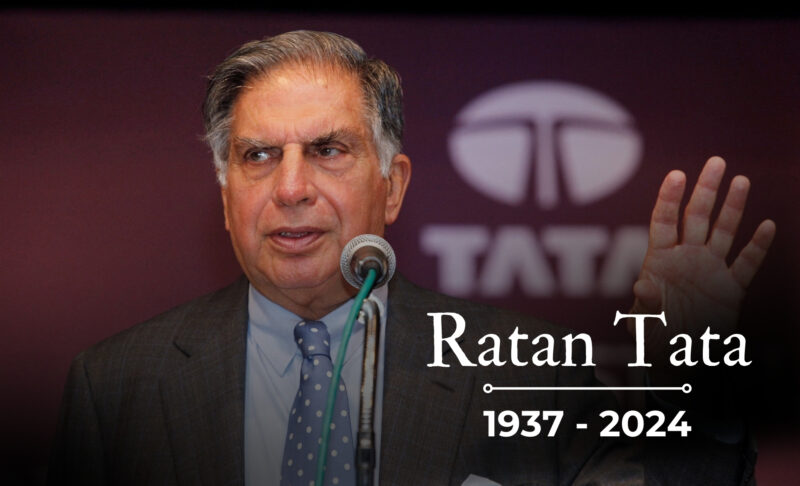Ratan Tata, one of India’s most respected industrialists, is a name synonymous with integrity, innovation, and philanthropy. Born on December 28, 1937, in Mumbai, Ratan Tata is the former chairman of Tata Sons, the holding company of the Tata Group, one of India’s largest and most diversified conglomerates. His leadership not only elevated the Tata brand globally but also redefined the Indian corporate world.
Early Life and Education
Ratan Tata was born into the illustrious Tata family, a lineage that had been pivotal in shaping India’s industrial landscape. His father, Naval Tata, was a prominent figure in the family, but it was his great-grandfather, Jamsetji Tata, who laid the foundation of the Tata Group.
Ratan Tata completed his schooling at the prestigious Campion School in Mumbai and then moved to the U.S. for higher studies. He earned a degree in architecture from Cornell University in 1962, followed by a management course at Harvard Business School. Despite his elite education abroad, Ratan Tata returned to India to join the family business, reflecting his deep sense of responsibility toward his country and legacy.
Rise to Leadership
In 1962, Ratan Tata began his career at Tata Steel, one of the group’s largest companies. He started from the ground up, working on the shop floor and learning the nuances of the industry firsthand. His willingness to work with blue-collar workers earned him respect and allowed him to understand the pulse of the workforce.
In 1991, Ratan Tata was appointed chairman of Tata Sons, succeeding J.R.D. Tata. At the time, the Tata Group was a collection of largely independent companies with no centralized leadership. Ratan Tata implemented a more cohesive strategy, consolidating the group and promoting a unified brand image. His tenure marked the beginning of the Tata Group’s globalization.
Milestones in Leadership
One of Ratan Tata’s most significant achievements was the acquisition of international brands. Under his leadership, Tata Motors acquired Jaguar Land Rover (JLR) in 2008, a bold move that positioned Tata Motors as a global player in the automobile industry. Another notable acquisition was Tata Tea’s purchase of Tetley in 2000, which helped Tata expand into international markets.
However, it was not just the big-ticket acquisitions that defined Tata’s leadership. His vision to provide affordable transportation for the Indian masses resulted in the creation of the Tata Nano, the world’s cheapest car. Although the Nano did not achieve commercial success as expected, it showcased Ratan Tata’s commitment to innovation and his desire to improve the lives of everyday Indians.
Legacy of Philanthropy
Ratan Tata’s legacy is built not only on his business acumen but also on his unwavering commitment to philanthropy. As a custodian of the Tata family values, he expanded the scope of the Tata Trusts, ensuring that a significant portion of the group’s wealth went toward improving society. Through the Tata Trusts, Ratan Tata directed resources to critical areas such as healthcare, education, rural development, and scientific research. His contributions ranged from building hospitals, schools, and research institutions to supporting agricultural development and clean water initiatives in remote regions of India.
One of his most notable initiatives was expanding access to education. Tata supported several institutions, including the Tata Institute of Social Sciences (TISS) and the Indian Institute of Science (IISc), both of which have been pivotal in advancing education and research in India. His personal donations to foreign universities like Cornell and Harvard reinforced his global vision for education. In 2008, he made a historic $50 million donation to Cornell University, the largest-ever contribution from an international benefactor, furthering scholarship programs for underprivileged students.
Tata’s humanitarian contributions were evident during national crises. After the 2008 Mumbai terrorist attacks that targeted the Taj Mahal Palace Hotel, owned by the Tata Group, he personally oversaw the relief and rehabilitation efforts, providing support to victims and their families. This act of compassion reinforced his reputation as a leader who cared deeply for his community and employees.
Praised by the People: A Man of Integrity
Ratan Tata’s values of humility, ethical leadership, and people-centric decisions earned him immense respect from every corner of society. Despite his immense wealth, he always remained humble, choosing to live a modest life and avoid the trappings of fame. Tata famously said that businesses should not only focus on profits but also on how they can positively impact society, a philosophy he lived by throughout his career. His leadership style emphasized integrity, transparency, and a long-term vision, setting a benchmark for corporate governance in India and abroad.
Tata’s compassion and genuine concern for the welfare of the people made him one of the most beloved business figures in India. His investments in startups, mentorship of young entrepreneurs, and efforts to make Indian products and services competitive globally further showcased his forward-thinking approach.
Farewell to a Legend
Ratan Tata passed away on October 10, 2024, leaving behind a legacy that transcends business. His vision of using corporate success as a tool for social progress will continue to inspire generations to come. Tata’s life is a shining example of how leadership, when driven by compassion and a sense of duty to society, can create meaningful and lasting change.
In his passing, India and the world have lost a true icon, but Ratan Tata’s spirit will live on in the businesses he nurtured, the countless lives he uplifted, and the societal changes he championed. His legacy is not just one of industrial achievements but of humanity, integrity, and unwavering service to others.
